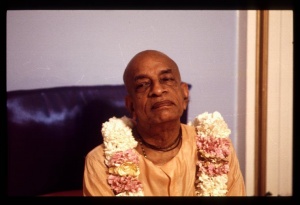CC Adi 5.171: Difference between revisions
m (1 revision(s)) |
(Vanibot #0054 edit - transform synonyms into clickable links, which search similar occurrences) |
||
| (One intermediate revision by one other user not shown) | |||
| Line 1: | Line 1: | ||
{{ | [[Category:Sri Caitanya-caritamrta - Adi-lila Chapter 05|C171]] | ||
<div style="float:left">'''[[Sri Caitanya-caritamrta|Śrī Caitanya-caritāmṛta]] - [[CC Adi|Ādi-līlā]] - [[CC Adi 5|Chapter 5: The Glories Of Lord Nityānanda Balarāma]]'''</div> | |||
<div style="float:right">[[File:Go-previous.png|link=CC Adi 5.170|Ādi-līlā 5.170]] '''[[CC Adi 5.170|Ādi-līlā 5.170]] - [[CC Adi 5.172|Ādi-līlā 5.172]]''' [[File:Go-next.png|link=CC Adi 5.172|Ādi-līlā 5.172]]</div> | |||
{{CompareVersions|CC|Adi 5.171|CC 1975|CC 1996}} | |||
{{RandomImage}} | |||
==== TEXT 171 ==== | ==== TEXT 171 ==== | ||
<div | <div class="verse"> | ||
eta bali’ nāce gāya, karaye santoṣa | :eta bali’ nāce gāya, karaye santoṣa | ||
kṛṣṇa-kārya kare vipra—nā karila roṣa | :kṛṣṇa-kārya kare vipra—nā karila roṣa | ||
</div> | </div> | ||
| Line 12: | Line 16: | ||
==== SYNONYMS ==== | ==== SYNONYMS ==== | ||
<div | <div class="synonyms"> | ||
eta | ''[//vanipedia.org/wiki/Special:VaniSearch?s=eta&tab=syno_o&ds=1 eta] [//vanipedia.org/wiki/Special:VaniSearch?s=bali’&tab=syno_o&ds=1 bali’]'' — saying this; ''[//vanipedia.org/wiki/Special:VaniSearch?s=nāce&tab=syno_o&ds=1 nāce]'' — he dances; ''[//vanipedia.org/wiki/Special:VaniSearch?s=gāya&tab=syno_o&ds=1 gāya]'' — chants; ''[//vanipedia.org/wiki/Special:VaniSearch?s=karaye&tab=syno_o&ds=1 karaye] [//vanipedia.org/wiki/Special:VaniSearch?s=santoṣa&tab=syno_o&ds=1 santoṣa]'' — becomes satisfied; ''[//vanipedia.org/wiki/Special:VaniSearch?s=kṛṣṇa&tab=syno_o&ds=1 kṛṣṇa]-[//vanipedia.org/wiki/Special:VaniSearch?s=kārya&tab=syno_o&ds=1 kārya]'' — the duties of Deity worship; ''[//vanipedia.org/wiki/Special:VaniSearch?s=kare&tab=syno_o&ds=1 kare]'' — performs; ''[//vanipedia.org/wiki/Special:VaniSearch?s=vipra&tab=syno_o&ds=1 vipra]'' — the ''brāhmaṇa''; ''[//vanipedia.org/wiki/Special:VaniSearch?s=nā&tab=syno_o&ds=1 nā] [//vanipedia.org/wiki/Special:VaniSearch?s=karila&tab=syno_o&ds=1 karila]'' — did not become; ''[//vanipedia.org/wiki/Special:VaniSearch?s=roṣa&tab=syno_o&ds=1 roṣa]'' — angry. | ||
</div> | </div> | ||
| Line 19: | Line 23: | ||
==== TRANSLATION ==== | ==== TRANSLATION ==== | ||
<div | <div class="translation"> | ||
After saying this, he danced and sang to his heart’s content, but the brāhmaṇa did not become angry, for he was then serving Lord Kṛṣṇa. | After saying this, he danced and sang to his heart’s content, but the brāhmaṇa did not become angry, for he was then serving Lord Kṛṣṇa. | ||
</div> | </div> | ||
| Line 26: | Line 30: | ||
==== PURPORT ==== | ==== PURPORT ==== | ||
<div | <div class="purport"> | ||
Mīnaketana Rāmadāsa was a great devotee of Lord Nityānanda. When he entered the house of Kṛṣṇadāsa Kavirāja, Guṇārṇava Miśra, the priest who was worshiping the Deity installed in the house, did not receive him very well. A similar event occurred when Romaharṣaṇa-sūta was speaking to the great assembly of sages at Naimiṣāraṇya. Lord Baladeva entered that great assembly, but since Romaharṣaṇa-sūta was on the vyāsāsana, he did not get down to offer respect to Lord Baladeva. The behavior of Guṇārṇava Miśra indicated that he had no great respect for Lord Nityānanda, and this idea was not at all palatable to Mīnaketana Rāmadāsa. For this reason the mentality of Mīnaketana Rāmadāsa is never deprecated by devotees. | Mīnaketana Rāmadāsa was a great devotee of Lord Nityānanda. When he entered the house of Kṛṣṇadāsa Kavirāja, Guṇārṇava Miśra, the priest who was worshiping the Deity installed in the house, did not receive him very well. A similar event occurred when Romaharṣaṇa-sūta was speaking to the great assembly of sages at Naimiṣāraṇya. Lord Baladeva entered that great assembly, but since Romaharṣaṇa-sūta was on the ''vyāsāsana'', he did not get down to offer respect to Lord Baladeva. The behavior of Guṇārṇava Miśra indicated that he had no great respect for Lord Nityānanda, and this idea was not at all palatable to Mīnaketana Rāmadāsa. For this reason the mentality of Mīnaketana Rāmadāsa is never deprecated by devotees. | ||
</div> | </div> | ||
__NOTOC__ | |||
<div style="float:right; clear:both;">[[File:Go-previous.png|link=CC Adi 5.170|Ādi-līlā 5.170]] '''[[CC Adi 5.170|Ādi-līlā 5.170]] - [[CC Adi 5.172|Ādi-līlā 5.172]]''' [[File:Go-next.png|link=CC Adi 5.172|Ādi-līlā 5.172]]</div> | |||
__NOTOC__ | |||
__NOEDITSECTION__ | |||
Latest revision as of 19:04, 19 February 2024

A.C. Bhaktivedanta Swami Prabhupada
TEXT 171
- eta bali’ nāce gāya, karaye santoṣa
- kṛṣṇa-kārya kare vipra—nā karila roṣa
SYNONYMS
eta bali’ — saying this; nāce — he dances; gāya — chants; karaye santoṣa — becomes satisfied; kṛṣṇa-kārya — the duties of Deity worship; kare — performs; vipra — the brāhmaṇa; nā karila — did not become; roṣa — angry.
TRANSLATION
After saying this, he danced and sang to his heart’s content, but the brāhmaṇa did not become angry, for he was then serving Lord Kṛṣṇa.
PURPORT
Mīnaketana Rāmadāsa was a great devotee of Lord Nityānanda. When he entered the house of Kṛṣṇadāsa Kavirāja, Guṇārṇava Miśra, the priest who was worshiping the Deity installed in the house, did not receive him very well. A similar event occurred when Romaharṣaṇa-sūta was speaking to the great assembly of sages at Naimiṣāraṇya. Lord Baladeva entered that great assembly, but since Romaharṣaṇa-sūta was on the vyāsāsana, he did not get down to offer respect to Lord Baladeva. The behavior of Guṇārṇava Miśra indicated that he had no great respect for Lord Nityānanda, and this idea was not at all palatable to Mīnaketana Rāmadāsa. For this reason the mentality of Mīnaketana Rāmadāsa is never deprecated by devotees.